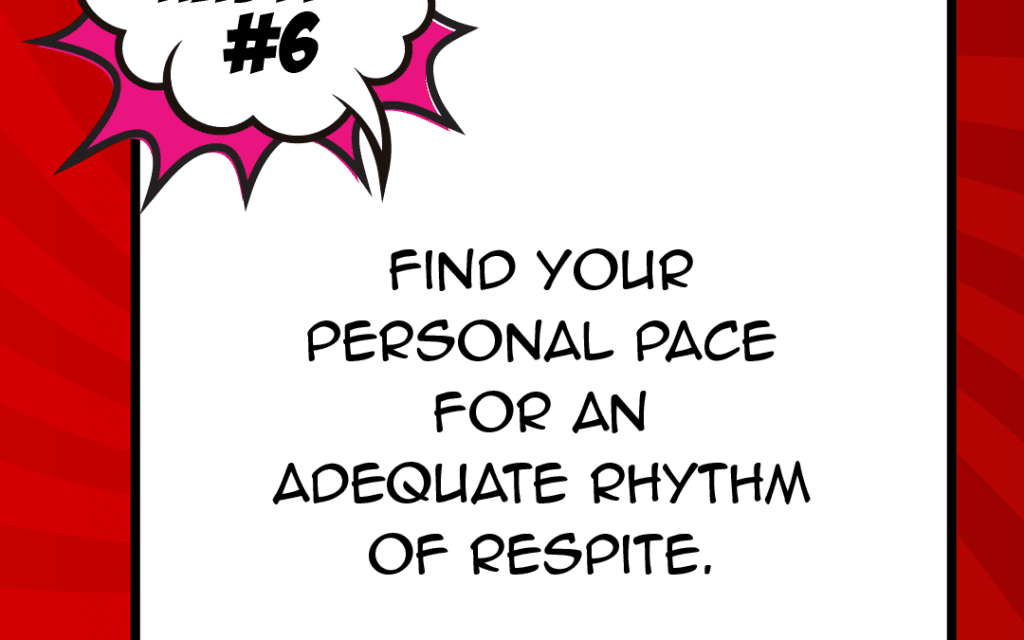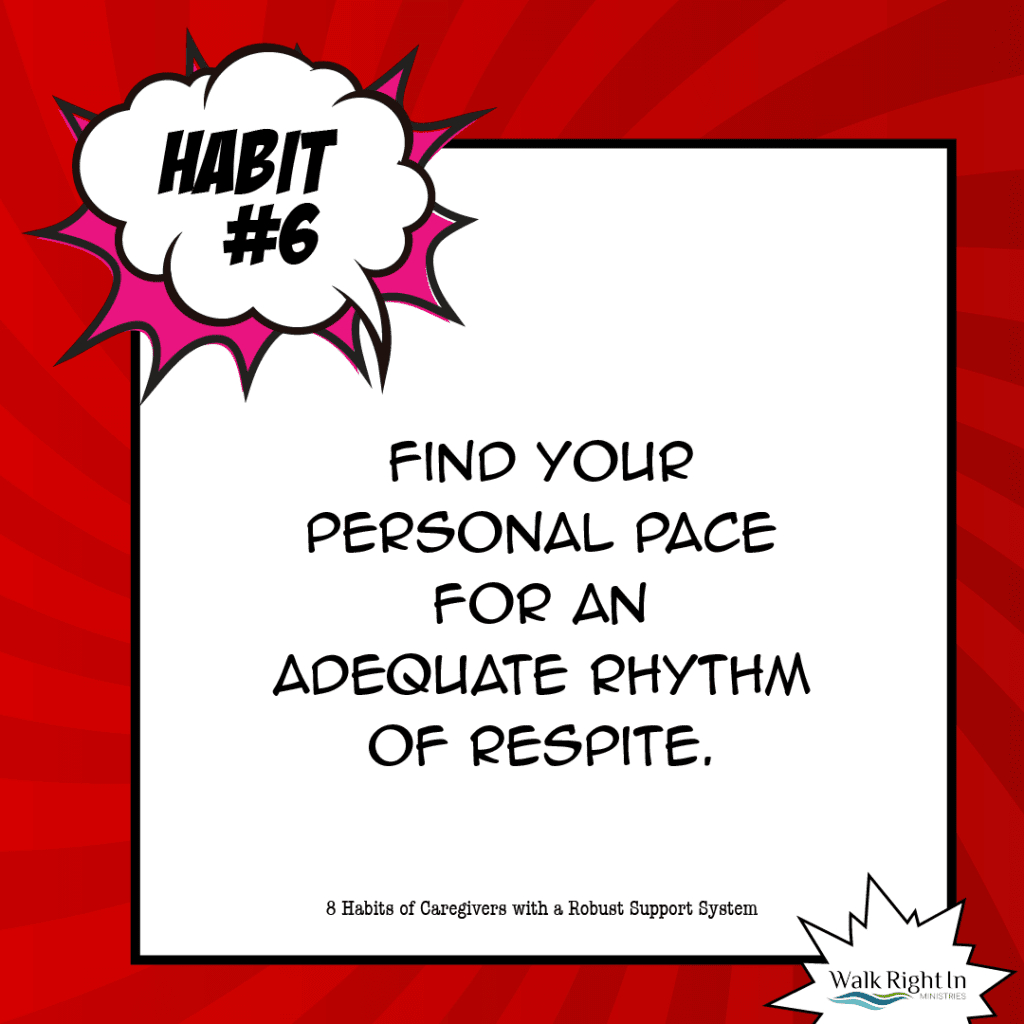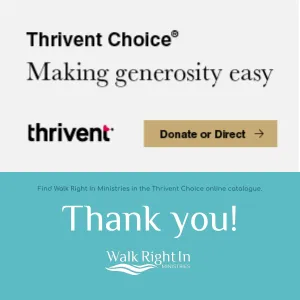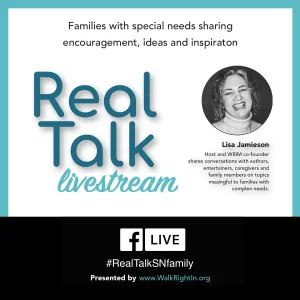
Parents, adult siblings, and others who care for someone with complex medical needs or developmental disabilities struggle to get the breaks and rest they need. The obstacles are numerous and varied so it is tempting to just quit trying. I’m here to suggest there is a way to approach respite that offers some satisfying and beneficial balance.
There is an adequate rhythm of rest to be found and it’s as unique as you are.
Now before you tune me out because your situation seems impossible, hear me out. I intimately understand many issues getting in your way. My own daughter’s medical and behavioral needs are tremendously complicated. I am hesitant to leave her in someone else’s care — for her sake and theirs. The reality is, even when I am desperate and my need for a break outweighs other concerns, relief is not always available. It is also true that I am often simply too tired, busy or distracted to investigate options. The idea of persuading helpers and facing potential rejection is exhausting too.
Probably like you, I’ve been tempted to minimize the need, ignore the need, or altogether give up trying to find ways to get my needs for rest met.
Yet some reasonable amount of regular refreshment is essential for having meaningful and enduring relationships, maintaining the physical and mental stamina, keeping emotionally balanced, and experiencing a sense of joy in ordinary life.
I tend to believe that I am my daughter’s most safe place. I feel a tremendous responsibility in being her primary protector. I can even tend to feel responsible for protecting others from her care. It can be hard to see the boundary lines between my responsibility for Carly and God’s capacity to ensure that she is protected, even if I am not always there for her.
Caregivers often have trouble believing that their constant caring can be interrupted without dire consequences. Tired caregivers may avoid setting limits on what their loved one demands. And they may have difficulty being confident that anyone else will do an adequate job.
Caregiver enmeshment is a symptom of lack of trust and even pride. “Ouch!” you might say. Believe me, I understand how vulnerable our loved ones can be. But let’s be honest, we are powerless over so much more than we choose to accept. We must never lose track of our personal limits — physically, mentally, emotionally — and what we are called to do. Then we must do no more and no less than that.
Moses’ own mother Jochebed had to face a similar recognition of her limits and trust God. She painted pitch on a basket to keep it safely afloat holding her son. But she ultimately put her trust in God when she set that basket in the reeds. His parents took a step of faith (Exodus 2). They could do no more and no less than that.
If I want God to do a miracle in my daughter Carly’s life, I need to get out of the way and give Him room to do it.
Matthew 13:58
And so [Jesus] did only a few miracles there because of their unbelief.
Almighty God has repeatedly shown us a model for patterned trust — and it often looks like rest. God created the universe in six days, then rested on the seventh day. God provided manna in the wilderness for six days out of every week — for 40 years — but not on the seventh day. He gave a double measure of manna on Day 6 so that everyone could and would rest on Day 7.

There are so many more rest and boundary patterns to be found in the scriptures. And there can be wonderful value in spending time exploring them. But one word points us to God’s motive — trust. God desires intimate relationship with His beloved creation. And trust is an utmost measure of intimacy.
We trust God by slowing down, paying attention to Him, setting all other loves and concerns aside, and trusting Him to use His power, wisdom, and provision for our best.
Jesus prioritized both personal boundaries (self-care) and prayer (soul care). In his book, Your Best Life in Jesus’ Easy Yoke, Bill Gaultiere suggests it is especially important for caregivers to “learn to set limits for their own soul care.” He points out that Jesus “had far more stress, far more pressure, and far more responsibility than any of us and yet he remained relaxed, joyful, and generous with people.”
You might be thinking — sure, but Jesus was God, and I am not! Well, true enough. Jesus was exceedingly committed to His Father and to His calling. Yet, we can learn a great deal from what Jesus models. More than that, we can rely on the Holy Spirit to guide, provide, and empower us for rhythms of grace and rest with Jesus as our Supreme Guide and Protector.
Mark 4:38-40
Jesus was sleeping at the back of the boat with his head on a cushion. The disciples woke him up, shouting, “Teacher, don’t you care that we’re going to drown?” When Jesus woke up, he rebuked the wind and said to the waves, “Silence! Be still!” Suddenly the wind stopped, and there was a great calm. Then he asked them, “Why are you afraid? Do you still have no faith?”
HABIT #6 OF CAREGIVERS WITH A ROBUST SUPPORT SYSTEM
Find your personal pace for an adequate rhythm of respite.
As we launch into this three-part blog series on respite rhythms, it’s helpful to reflect on the definitions of three critical words while holding fast to our trust in God:
Respite
a short period of rest or relief from something difficult or unpleasant.
Adequate
good enough; sufficient for a specific need or requirement; of a quality that is acceptable but not better than acceptable
Pacing
walk at a steady and consistent speed; lead in order to establish a competitive speed.

Did you notice anything helpful from these definitions? Words that stick out to me include — short, rest, relief, difficult, sufficient, specific, acceptable, steady, lead.
I’m not a fan of the word “short” in this context. (We’ll talk more about that word later.)
That last word is especially intriguing to me. Lead! How often I have felt like a victim of my circumstances. My family is at its strongest when we follow Jesus’ lead in advocating for rest rather than allowing the situation to dictate our patterns. We often struggle to know how to wear the yoke of caregiving in strength. Like an immature ox, we strain and charge into the job forgetting that we can trust Jesus’ invitation.
Matthew 11:28-30
Jesus said, “Come to me, all of you who are weary and carry heavy burdens, and I will give you rest. Take my yoke upon you. Let me teach you, because I am humble and gentle at heart, and you will find rest for your souls. For my yoke is easy to bear, and the burden I give you is light.”
In caregiving as in all of life, we’re in a learning process. We don’t need to do it all perfectly. Progress toward the goal is a powerful energizer and encourager.
Begin asking God what kinds of respite you need to keep yourself in an acceptable and progressively improving pattern. How might you go about receiving a degree of relief that enables you to maintain reasonable consistency in your quality of life and the quality of care you are able to give your loved one?
Cultivating a robust support system is certainly part of this. But there’s more to it. We’re going to explore that over the next couple of weeks.
Because finding adequate respite rhythms holds such significant opportunity for caregivers, we’re devoting the next three posts to the topic. We’ll be exploring more ways of finding a reasonable pacing of refreshment in your family and/or marriage when living with someone who has disabilities and/or complex medical needs. Watch for Respite Rhythms (Part 2) next week.
Respite Rhythms (Part 1): Start with Trust
Respite Rhythms (Part 2): How Much is Enough?
Respite Rhythms (Part 3): Pace Yourself!
RELATED: 8 Habits of Caregivers with a Robust Support System
“Due to God’s common grace, no one exists in the extreme of complete brokenness. Due to the fall, no one enjoys the extreme of complete blessing.”
Stephanie O. Hubach, Same Lake Different Boat

Lisa Jamieson is a caregiver consultant, pastoral counsellor and author of popular books and Bible studies including Finding Glory in the Thorns and Jesus, Let’s Talk. Lisa and her husband, Larry, live in Minnesota with the youngest of their three grown daughters, Carly, who has Angelman Syndrome. Together, the Jamiesons founded Walk Right In Ministries in 2008, a non-profit organization building faith and community with special needs families.










What you sad makes lots of sense. I am at a loss at finding an adequate support system for myself and for my child.
I sure do understand this challenge. We’re going to be praying God brings new hope and help for you and your family, Nicole. And if there is any way WRIM might help you think through new or added ways to cultivate support, I hope you will reach out.